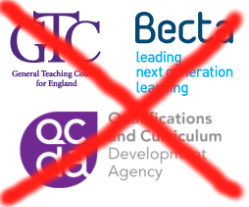The post-Becta, QCDA and GTCE future.
 These thoughts are my own and don’t represent my employer’s, my wife’s or the those of Father Christmas. 😉
These thoughts are my own and don’t represent my employer’s, my wife’s or the those of Father Christmas. 😉
On the one hand, the Conservatives’ education policies heavily (and negatively) influenced my vote in the recent General Election. On the other hand, now that we’ve got Mr Gove, at least he’s had the courage of his convictions to get rid of three bodies:
Becta
Probably the most useful of the three to go, Becta was the government’s advisory service for educational technology. I was part of their Open Source Schools project and attended events such as BectaX. Unfortunately, they became less relevant, increasingly unwieldy and seemingly more subject to internal politics as time went on.
QCDA
The Qualifications and Curriculum Development Agency advised the government on the National Curriculum, assessment and qualifications. The new coalition government believe that its functions can be discharged more effectively in other ways (e.g. Ofqual). I didn’t have much dealings with them, but never really knew why they were there.
The QCDA’s sample National Curriculum schemes of work were unfortunately taken as gospel by some Heads of Departments and Senior Leaders – rather than as a basis upon which to innovate. Sometimes it is your fault if the tools and resources you produce are used as instruments of repression…
GTCE
I have never hidden my utter contempt for the General Teaching Council for England, noting how ridiculous their ‘code of conduct’ for teachers was. The fact that they took money off you and then gave it back if you were employed as a teacher seemed utterly pointless. Their only purposes seemed to be to send out glossy magazines and discipline teachers who take drugs. I found their lack of proper consultation, their arbitrary stance and their waste of public money shocking.
The future?
I’m really pleased that these three organizations have gone together rather than in a piecemeal fashion. I think it signals a bright future for schools in England – so long as the Academies programme isn’t used just to shuffle the money from quangos to consultants. I hope that getting rid of these organizations means that money can be channeled more effectively to schools, partnerships, federations and authorities who in a position closer to the ground to gauge its impact.
Grassroots innovation and sharing of practice through online networks should now take centre stage. Instead of people being able to hide behind (their readings of) recommendations made by quangos, they’ll have to actually engage and think about their particular context. That can only be a good thing.
A note of caution, however. Just because a tool such as Twitter is open and decentralized does not make the networks it facilitates open and decentralized. We need to be careful not to fall prey to the age-old “it’s not what you know, it’s who you know” and gatekeeper-ism. 🙂
I’d really like to hear YOUR views on this. Are you a teacher in the UK? What do you think? If you’re not, what’s your take from the outside?

 As I’ve mentioned once or twice before, teaching is only a ‘profession’ in the loosest sense of the term. Teachers don’t get paid as much or enjoy the same sort of status as, say, doctors and lawyers, yet our job combines very difficult elements: social worker, instructor, mentor, teamworker, and role model, to name but a few.
As I’ve mentioned once or twice before, teaching is only a ‘profession’ in the loosest sense of the term. Teachers don’t get paid as much or enjoy the same sort of status as, say, doctors and lawyers, yet our job combines very difficult elements: social worker, instructor, mentor, teamworker, and role model, to name but a few.